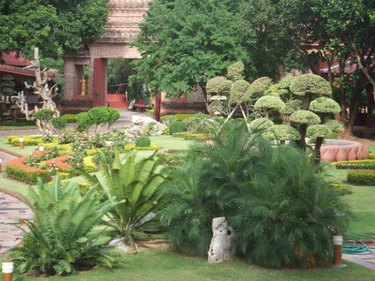
Plants require the right kind of soil to grow their best. Some soils are naturally alkaline while others are acid. Acid-loving plants won't grow well in alkaline soil. Information on which type of soil plants prefer is listed on labels and in catalogs.
Gardeners who don't know if their soil is alkaline or acid can find out with simple kits from their garden center. Chemical or organic fertilizers amend soil to suit acid-loving plants.
Video of the Day
Video of the Day
Soil pH
A pH kit will measure the potential of the hydrogen (pH) in your soil, indicating the relative acidity or alkalinity on a scale of 0 to 14. Seven is neutral. Acid soils have a pH of 7.0 or lower. Soils with a pH of 4 are extremely acid while 6 is slightly acid.
Without a proper pH level, plants wither or are stunted because they can't get nutrients from the soil or fertilizer.
Soil pH levels are affected by animal and bird droppings, current and previous chemicals in fertilizers and chemicals in the water. Previous plantings in the soil can alter its pH, as well as what's growing in surrounding soil. Most pH test kits will suggest which fertilizers can neutralize or counteract your soil's deficiencies.
Acid-Loving Plants
Vegetable gardeners planting corn, squash, potatoes, okra, lettuce, onions, peppers, melons, asparagus, spinach and beans should choose acid soil or fertilizer that amends the pH to acid levels to get maximum yields.
Landscape garden beds that include some varieties of roses, lilacs, sunflowers, hydrangeas, camellias, pine trees, turf grass and rhododendrons grow better in an acidic soil, as do perennials including daffodils and tulips.
Acid-loving herbs include garlic, chives and parsley.
Blueberries, azaleas, gardenias and hydrangeas love extremely acid soil of pH 4.0.
Fertilizer Amendments
Chemical fertilizers containing ammonium or organic fertilizers with protein (amino acids) acidify neutral and alkaline soils. Ammonium is nitrogen and hydrogen (NH3-). As ammonium fertilizers create nitrate, they release free hydrogen atoms to create an acid soil.
Too many free hydrogen atoms make it difficult for plants to get the chemical nutrients they need from the soil. It also increases the amount of aluminum in the soil, which can become toxic below pH levels of 5.5. Frequent testing and careful use of fertilizer is necessary to avoid acidifying the soil too much. Lime eliminates free hydrogen atoms and neutralizes the soil if this happens.
Buildup
Most plants grow best in soils with a pH between 6.0 and 7.0. Cow manure, bone meal, bat guano, organic compost and green manure crops acidify while adding organic material to the soil. Inorganic fertilizers are compositions that add exact ratios of chemicals.
Soil can become more acid over time if given too much ammonium or protein fertilizer. Gardeners need to test and apply the correct fertilizer annually.